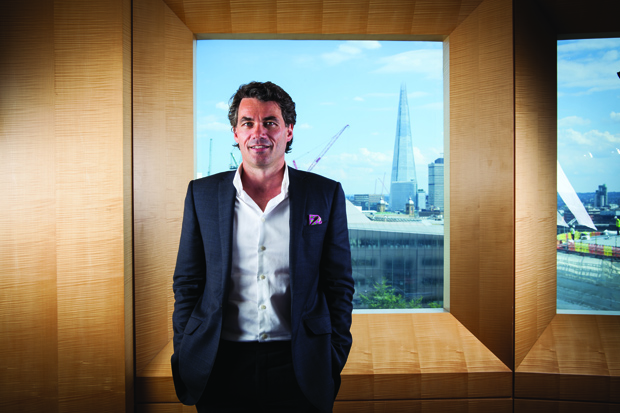
Right, let's get this out of the way: Gavin Patterson walks in and you think, blimey, he's so handsome and well groomed he should be heading Armani, not a vast, techy monolith like BT. Slim, tall, chisel-jawed, dark-eyed, luxuriant-haired, gentle and genial in manner, the 46-year-old seems altogether too glossy a package to be heading a crusty FTSE 100 giant - the oldest telecom firm in the world.
But then again this is a corporation that is used to shifts in style. Less than a decade ago I sat in the same ninth-floor, pale-panelled CEO office interviewing Ben Verwaayen, the rumpled, brilliant, pixie-sized technologist who liked to write Dutch political party manifestos in his spare time and who committed BT to a multibillion-pound gamble on broadband.
In the same room, not three years ago, I also quizzed Ian Livingston, the super-sharp Glaswegian with Polish-Jewish roots whose formative years in accountancy and electricals gave him just the eye for detail to cut and cut again BT's costs, while pouring money into wiring up Britain with fibre-optic cable and desperately sorting out the group's pension deficit.
And now Patterson, ex-Procter & Gamble and Telewest, the Altrincham-born marketing whizz who took the top seat last year after Livingston shocked his board by suddenly bolting for a job in government. Patterson, quieter than Verwaayen, friendlier than Livingston, was formerly head of BT Retail, its consumer division, and has spent his first year in charge reaffirming the company's surprising new commitment to televised sport.
Last year he bought the UK rights to the European Champions League. This followed his earlier gambit of snatching the rights to a clutch of Premier League matches - annoying BT's biggest rival, BSkyB, in the process.
Sky, says BT, had started the fight by refusing to sell its Premier League matches to others at a reasonable wholesale rate, while rapidly building its own broadband service. Even so, everyone was astounded by the telecom giant's decision to outbid its new rival. Yet to meet Patterson, so sleek and deferential, you couldn't possibly believe he was up for the aggro.
Well, think again. "Our business is all about broadband and increasingly about fibre broadband. We have made this huge investment in fibre and we wanted to see if we could push it further, and content is the key lever to do that. We couldn't get access to sport in the way we wanted via Sky and if we didn't address that, ultimately, our broadband business would suffer."
He makes the move into football sound logical and rooted in Verwaayen's gamble of betting the house on broadband. "People laughed at him," Patterson reminds me. "We wanted one million customers. Now we have nearly 19 million." But only seven million of them buy the service from BT - others use rival ISPs, including Sky, selling on the BT network.
Verwaayen, who hired Patterson into BT a decade ago, also made 'a big bet' on BT's Global Services arm, its B2B division, which provides 40% of the firm's £18bn revenues and works with the world largest companies - a bet that blew up some time later, leading to two profit warnings and all that Livingston cost-shaving. "But it's a decent business now," says Patterson.
His focus is on crafting a consumer proposition that binds in BT's customers and feeds naturally into its B2B and infrastructure strength - no prizes for guessing that his early years at P&G, best in class for branding and product differentiation, have had an influence. Hence the Patterson-led BT has doubled down on football and is spending close to £2bn buying sport rights to establish its two BT Sports TV channels, giving its broadband customers something for free that others pay to have, and allowing them to watch it on any platform.
So complete is its need to be seen as a branded provider of content that its London head office in Newgate Street, opposite St Paul's, has carried the huge words BT SPORT above its doors for more than a year, almost as if the whole company has been renamed.
And sport is not the half of it. Already this summer BT has relaunched itself into the mobile phone market, 13 years after it sold off its Cellnet arm (later rebranded as O2). Since July it has been softly selling a new mobile offering to business customers, with a consumer launch widely expected before Christmas.
"Actually, I told the press that the consumer launch would be "in the next 12 months",' Patterson corrects me. "People have speculated that it's before Christmas but we'll announce it when we're ready to sell it."
Branded BT or something new? Sold on price or on added gizmos? He frowns. 'I'm not giving any details. We have benefited a lot from not making a song and dance about it until we are ready to launch. If you look at what we did with Sport, we only announced it when we were ready to sell."
Patterson is genial until you push him, when he reveals the flinty side that has propelled him to the top. Fifteen years ago, he was selling Pantene shampoo and other beauty products for P&G, so the combination of sheen and sharpness should not surprise. But the way he is pushing BT to be braver has turned heads. It brings yet another shift in culture for the telecom giant's 80,000 employees.
Everything now seems a little bit bolder - just look at the chief executive's office. Where Livingston had one flatscreen TV opposite his desk, Patterson has three. Where the old CEO had one framed, signed football shirt (Celtic), the new one has two (Liverpool). One shirt is Steven Gerrard's, the other is Luis Suarez's.
Now there's another risky choice to admire... Patterson just smiles. "It shows what a fine line there is between success and failure."
Read the full interview with Gavin Patterson on .


.jpg)


.jpg)